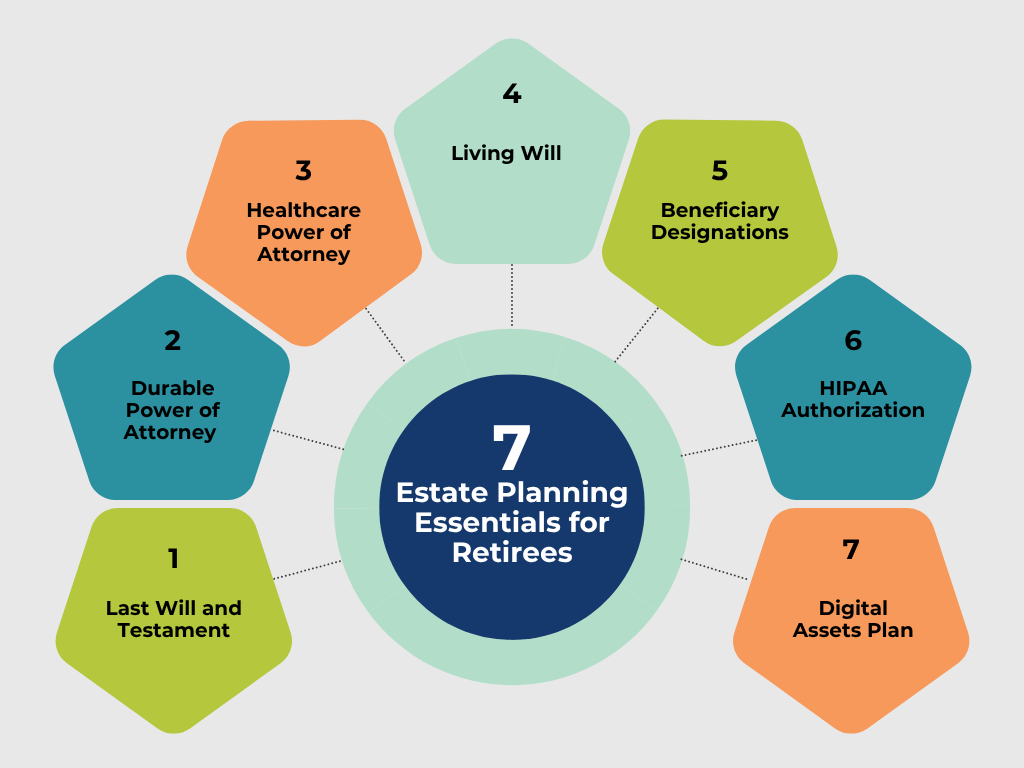If you’re like many retirees in Ohio, ‘estate planning’ is something you say you’ll get around to eventually. Talking about end-of-life details is never fun, but what happens if you don’t get around to planning until it’s too late?
At Stage Ready Financial Planning, we understand that peace of mind is one of your highest priorities. You want to know that you can sustainably enjoy your ideal retirement lifestyle. It helps you sleep at night knowing that your investments are working hard for you. It’s important that you’re not paying Uncle Sam more in taxes than you need to. To achieve these things and e peace of mind, you’ll need to address some estate planning essentials.
In this article, we’ll discuss the top 7 estate planning essentials as part of your estate planning checklist for retirement.
Key Takeaways
- Estate planning is basically a roadmap that ensures your assets are distributed according to your wishes and your healthcare and financial decisions are handled by a person you trust if you become incapacitated.
- Your estate plan is not a single document but a suite of essential items, including your Last Will and Testament, Powers of Attorney, a Living Will, and up-to-date beneficiary designations for your financial accounts.
- To protect your family and your wealth, it’s important to avoid common mistakes like delaying the process, failing to update your documents after major life events, and not coordinating your plan with qualified professionals.
Understanding the Basics of Estate Planning
Think of estate planning as creating a roadmap that covers two major areas.This roadmap serves as your personal estate planning checklist, ensuring all aspects of your financial and healthcare wishes are considered.
First, it outlines exactly how you want your assets distributed after you’re gone. Second, it explains how you want your assets, healthcare, and minor children cared for if you eventually can’t make your own decisions. Even if it feels daunting, creating and updating your estate plan is a gift to your family members and loved ones.
Why It Matters For Retirees
You’ve likely spent decades building up your retirement accounts and paying down your mortgage. You’re excited to finally have the financial freedom to travel and enjoy your retirement with your family members. The reality is that over the course of your retirement, your health will change, and you may start to ask yourself these questions:
- What if I’m unable to make financial or health decisions for myself?
- What happens to my house and my investments if I’m no longer here?
- How much of my estate is the government going to take in taxes?
- Do I need a revocable living trust?
Without a proper estate plan in retirement, you’ll likely lose the ability to answer these questions the way you want. Your state laws might dictate how your assets are divided, and this may not align with what you truly want for your family members.
Not having an updated estate plan can also lead to a lengthy, costly probate process and unnecessary taxes. This might reduce the inheritance your loved ones receive and cause extra stress during an already difficult time.
7 Essentials for Estate Planning Every Retiree Needs
Building or updating your estate plan doesn’t have to be overwhelming. It typically involves a set of estate planning documents that work together to cover all your bases.

Here are 7 essentials every retiree should consider for their estate plan. Consider using this as your starter estate planning checklist:
1. Last Will and Testament
This legal document is the core of your estate plan. It directs how your assets will be distributed after your death through the probate process. Your will also allows you to appoint a guardian if you have minor children. You might think guardianship isn’t relevant in retirement. It can be if you have adult children with special needs or are the primary caregiver for grandchildren.
Even without dependents, a will is important for giving your property to the people or organizations that matter to you. Passing away without a will is known as intestacy. It means that your state gets to decide how your assets are distributed.
For example, if you pass away without a valid will in Ohio, item C of the Ohio Revised Code 2105.06 says that:
- If you die in Ohio without a will and are married
- Have one child but your spouse isn’t the biological parent
- Your spouse gets the first $20,000 plus one half of the remaining intestate estate, and your child gets the rest, per stirpes
Your state’s approach might not align with your wishes for your family members.
2. Durable Power of Attorney (DPOA)
A Durable Power of Attorney for finances is a legal document that grants someone the authority to manage your money for you if you become incapacitated. Essentially you are giving financial power to someone you trust to help you pay bills and handle your savings. The name of this person is your “agent” or “attorney-in-fact.”
“Durable” means it remains effective if you become mentally or physically incapacitated, lasting until your death. Without a Power of Attorney legal document, your family members might have to go to court to get conservatorship. This is a much more complicated and public process.
3. Healthcare Power of Attorney (HCPOA)
A healthcare Power of Attorney is a legal document that allows you to name an agent who can make medical decisions on your behalf. This document is sometimes called a health care proxy.
Your healthcare Power of Attorney is designed to fulfill your wishes regarding medical treatments, surgeries, and end-of-life care. Making these decisions in advance can provide mental relief to your family members during a difficult time.
4. Living Will or Advance Healthcare Directive
Your Living Will is a legal document that outlines what you want for life-sustaining care, if you become terminally ill or permanently unconscious. This document is sometimes referred to as your Advance Healthcare Directive.
Your Living Will gives your family members clear instructions about what medical interventions you do and do not want. Ultimately this can ease the burden of painful decision-making for your family members.
5. Beneficiary Designations
A significant portion of your wealth might be held in accounts with beneficiary designations. Examples include your retirement accounts and life insurance policies. Beneficiary designations state who receives the assets in these accounts upon your death, bypassing your will and probate entirely. Many are surprised to learn that your will has no impact or control over your accounts with a beneficiary designation.
It’s important to review and update your beneficiaries regularly. This is especially true after life events like new marriages, divorce, or the birth of your grandchildren. Missing or outdated beneficiary designations are a very common estate planning mistake. They can lead to unintended consequences, such as disinheritance.
6. HIPAA Authorization
The Health Insurance Portability and Accountability Act (HIPAA) of 1996 was created to protect your medical privacy. A HIPAA Authorization form allows you to designate specific individuals to access your medical information. Without it, even your spouse or adult children might be denied access to your medical records.
You can file this helpful legal document with your specific medical provider as an additional step in your healthcare estate planning. For example, in Ohio, most healthcare providers will provide you with a state-approved HIPAA release form such as this. It works hand-in-hand with your Living Will and Healthcare Power of Attorney.
7. Digital Assets Plan
In our increasingly online world, your “estate plan” can now include more than just your physical property. Your digital assets have significant personal and sometimes financial value. These include online accounts, social media profiles, cryptocurrency, and files stored in the cloud.
A Digital Assets Plan outlines how you want these online items managed and discarded after your death or if you become incapacitated. You can provide login credentials or instructions for closing accounts. This prevents your digital life from becoming a tangled mess for your loved ones.
For example, Ohio recently passed the Uniform Fiduciary Access to Digital Assets Act, Chapter 2137 of the Ohio Revised Code. You can now make decisions about your online assets in your will and your Power of Attorney documents.
When to Start or Update Your Estate Plan
You might be thinking: ‘What if I’ve done nothing for estate planning?’ or ‘How often should I update my estate planning choices?’ Retirement is a great time to start or update your estate plan, and regular review is important, especially after big life events.
Key Life Events That Trigger the Need
Your life is constantly changing, and your estate plan should evolve with it. Certain events make reviewing and updating your estate plan a smart decision:
- Marriage or Divorce: These events typically change who you would want to inherit your assets as outlined in your estate plan. You’ll likely also want to change who can make healthcare decisions for you if you aren’t able.
- Birth or Adoption of Children/Grandchildren: You might want to include them in your estate plan. Minor children and grandchildren are often added through per-stirpes beneficiary designations or trust provisions.
- Death of a Spouse or Beneficiary: Similar to marriage and divorce, this life event requires re-evaluating who will receive your assets and who will serve in critical roles like executor or agent in your estate plan.
- Significant Change in Your Financial Situation: An inheritance, a major increase or decrease in your savings, the addition of large debts, or the opening or closing of a business might impact your existing estate plan.
- Changes in Your Health: If your health declines, it’s important to make sure your healthcare directives and living will are up-to-date and clearly understood.
- Moving to a New State: Estate planning laws and taxes vary by state, so moving to a different state should be a strong reason to review your estate plan.
- Changes in Tax Laws: Estate taxes and inheritance taxes can change over time. Your financial advisor, CPA, and attorney can help you navigate these complexities through ongoing tax planning.
How Often Should You Review Your Plan?
Even without a major life event, it’s smart to review your complete estate plan every three to five years. This improves the likelihood that your estate planning documents and beneficiary designations stay up to date with your wishes and estate tax laws.
Common Estate Planning Mistakes to Avoid
Even with good intentions, common pitfalls can derail your estate plan:
- Delaying the Process: The biggest mistake you can make is simply not having an estate plan. Life is unpredictable, and waiting “until later” leaves your loved ones vulnerable. Using an estate planning checklist sooner rather than later is always a good idea.
- Failing to Update Documents and Beneficiaries: Life changes quickly. An outdated will or beneficiary designation on your life insurance policies can have serious consequences for your family members and overall estate plan.
- DIY Estate Planning for Complex Situations: Online template providers like Legal Zoom can be a starting point for very simple situations. That said, they often lack the nuance needed for anything beyond the most basic estates. Relying solely on them for complex business assets or family dynamics can lead to costly errors and disputes. Seek legal or tax advice from qualified professionals, like your estate attorney, when creating your estate plan.
- Not Communicating Your Plan: Your family doesn’t need to know every detail, but they should know where to find your estate planning documents and who to contact if something happens.
- Not Considering Taxes: Overlooking estate taxes, inheritance taxes, and gift taxes might reduce the value of what you pass on. Proactive tax planning and tax advice about your estate plan can help your family avoid frustrating surprises.
Why Work with a Financial Planner?
Staying on top of your estate planning, especially when you’re focused on enjoying retirement, can feel like a lot to handle. This is where your trusted financial advisor comes in. At Stage Ready Financial Planning, we don’t just talk about your investments. We help you craft the bigger picture, including your estate plan.
We work alongside your estate attorney and tax advisor to ensure your estate plan works to accomplish everything you want it to:
- Organize Your Assets: We’ll help you compile a clear picture of your financial accounts, physical assets, and other valuables for your estate plan.
- Optimize Beneficiary Designations: We’ll make sure your retirement accounts and insurance policies have updated beneficiaries to help your family members avoid probate wherever possible.
- Strategize for Tax Efficiency: We can help you understand any potential estate taxes, inheritance taxes, or gift taxes you might face. We will explore strategies to reduce them leveraging tax advice from your tax advisor and estate attorney.
- Provide Objective Guidance: We strive to provide a calm, knowledgeable perspective to help you make informed financial decisions with peace of mind.
Ready to Build an Estate Plan That Fits Your Life? Contact Stage Ready Financial Planning for Personalized, Expert Help
Don’t leave your hard-earned assets and healthcare to chance! If you’re a retirement saver over 50, or recently retired in Southern Ohio, and want to ensure your estate plan is handled with care and efficiency, we’re here to help.
Contact Stage Ready Financial Planning today for personalized guidance that gives you confidence in your family’s financial future. Schedule your complimentary intro call today and get started on your estate planning checklist!
FAQs
Here are some common questions we hear all the time about estate planning:
What needs to be done for estate planning?
Estate planning involves a few important steps. To begin your estate planning checklist, you should first list all of your assets. This includes everything from your financial accounts and retirement accounts to real estate, personal property, and even digital assets. Next, you’ll need to decide how these assets should be distributed to your family members. You will accomplish this through beneficiary designations and your estate planning documents.
With these important decisions made, you now have an outline for your estate plan. Using this information, your estate attorney will draft or update your estate planning documents like your Last Will and Testament, Living Will, and Power of Attorney documents. They can also help you review your beneficiary designations.
The estate planning process should also include making decisions about your potential incapacity. You do this by drafting legal documents like a Durable Power of Attorney for finances (granting financial power) and a Healthcare Power of Attorney (health care proxy). Your estate attorney and financial advisor may suggest creating a revocable living trust to make planning easier for your family and protect your minor children or disabled children.
Once you’ve put the important parts of your estate plan in place, the next step of the process is to regularly review and update your estate plan over time. Consider working with professionals like a financial advisor, estate attorney, and tax advisor to ensure your plan is comprehensive and effective.
What is considered a high net worth estate?
The definition of a “high net worth estate” is subjective. That said, it might refer to estates with assets that exceed the federal estate tax exemption limit. For 2025, this exemption is set at $13,990,000 per individual, or $27,980,000 for married couples. If your estate exceeds these amounts, it might be considered a high net worth estate and potentially subject to federal estate taxes.
Even if your focus is on living a comfortable retirement rather than managing a multi-million dollar empire, it can still be helpful to understand these thresholds. Some states also have their own estate and inheritance taxes, which might apply at lower amounts than the federal limits. Consider working with your financial advisor and tax advisor to help you develop the best strategy for your own tax planning.
What is the difference between a Will and estate planning?
Your Last Will and Testament, or simply your will, is a legal document that outlines how your probatable assets should be distributed after your death. It also allows you to name guardians for your minor children or dependent disabled children.
While very important, the estate planning process includes much more than your will. It features a suite of estate planning documents and strategies designed to manage your assets during and after your lifetime. These help you plan for potential incapacity, minimize estate taxes and inheritance taxes, and ensure your family members are protected.
Your will is a component, while estate planning is a comprehensive process to protect your assets and your family members. Always consider seeking legal or tax advice from qualified professionals as you explore what you need in your estate plan.
About the Author

Joseph A. Eck, CFP®, is a financial planner dedicated to helping retirement savers achieve their financial goals and build a solid estate plan. With years of experience in estate planning and retirement planning, Joseph provides personalized guidance and support to clients in Dayton and Southwest Ohio. He believes that everyone deserves to feel confident living their ideal retirement. Click here to learn more about Joseph.
Article References
- Trust & Will. “Intestate Succession by State.” https://trustandwill.com/learn/intestate-succession-by-state
- Ohio Revised Code. “Section 2105.06.” https://codes.ohio.gov/ohio-revised-code/section-2105.06
- Ohio State Bar Association. “LawFacts: Probate.” https://www.ohiobar.org/public-resources/commonly-asked-law-questions-results/law-facts/law-facts-probate/
- CNBC. “Out-of-date beneficiary designations are a common and costly mistake.” April 16, 2018. https://www.cnbc.com/2018/04/16/out-of-date-beneficiary-designations-are-a-common-and-costly-mistake.html
- U.S. Department of Health & Human Services. “Guidance Materials for Consumers.” https://www.hhs.gov/hipaa/for-individuals/guidance-materials-for-consumers/index.html
- Ohio Revised Code. “Chapter 2137: Uniform Fiduciary Access to Digital Assets Act.” https://codes.ohio.gov/ohio-revised-code/chapter-2137
- LegalZoom. https://www.legalzoom.com/
This communication is for informational purposes only and is not intended as investment, tax, accounting, or legal advice, as an offer or solicitation of an offer to buy or sell, or as an endorsement of any company, security, fund, or other securities or non-securities offering. This communication should not be relied upon as the sole factor in an investment making decision. Past performance is no indication of future results.
